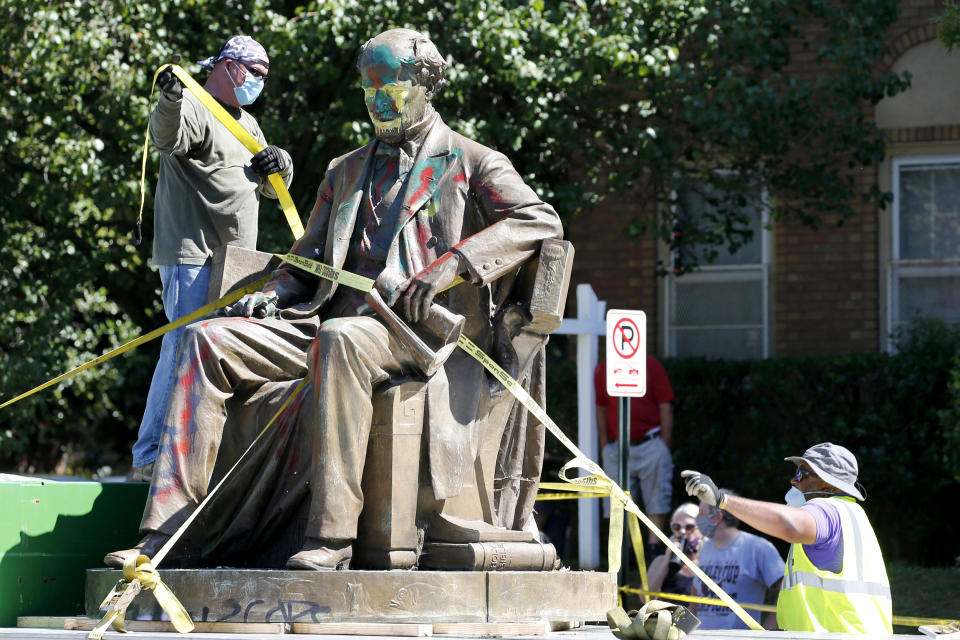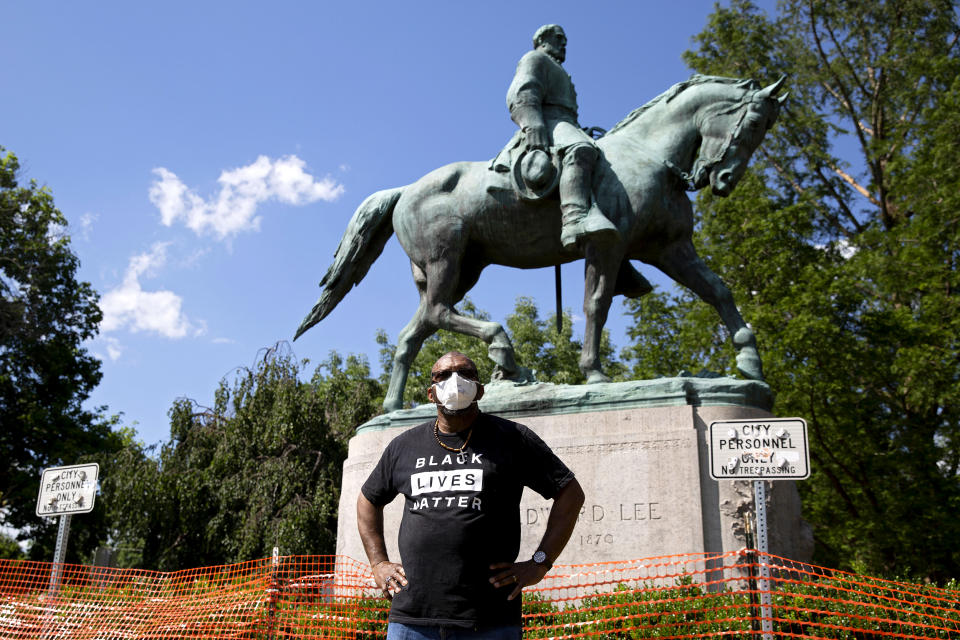Confederate monuments coming down in Virginia, but 2 prominent Lee statues remain
Monument Avenue in Richmond, Virginia, might need a new name soon.
Virginia has always been the state with the most Confederate statues, but in recent weeks, and especially in the city that was once the capital of the Confederacy, the statues have been coming down. Construction crews removed Stonewall Jackson and Matthew Fontaine Maury from Monument Avenue in Richmond last week, and more statues are expected to come down Monday.

But one very prominent monument that towers over Richmond remains standing.
The six-story-tall statue of Confederate Gen. Robert E. Lee, a state-owned memorial that Gov. Ralph Northam has committed to taking down, is stuck in court, thanks to an injunction over a deed the state signed when it took on the statue. Essentially, when the statue arrived in Richmond in the late 1800s, the state told landowners in the area that it would keep the monument intact — and the plaintiffs argue that if the statue were removed, the state would be violating its original promise.
"The issue in the Richmond Lee case is what we call private law, which is that there's a property claim being made here that promises were made by the state to private property owners over 100 years ago," said Richard Schragger, a professor of law at the University of Virginia.
"When the state took the property and accepted the statue, it made promises to local landowners that it would keep the statue intact in perpetuity. ... It's like a claim that your neighbor promised you that, say you live in a homeowners association, that they would never use their property to build a gas station on it."
Download the NBC News app for breaking news and politics
Schragger said the Richmond case is particularly complicated because the court is weighing the "enforceability" of the agreement. In the current political climate, in which Confederate monuments are being removed, it's tricky to argue that the promise the state made to landowners should last forever, he said.
The injunction was originally for 10 days, but it was extended indefinitely. When the court will move forward is unclear, but advocates of removing the statue, like Richmond City Council member Michael Jones, remain optimistic.
"I don't think the injunction is going to last very long. ... I've been dealing with Lee and all these other statues for three years. I don't think they're going to have a legal leg to stand on," Jones said of the plaintiffs. "This is just their last-ditch attempts. They'll continue to try, but it's going to come down. It's going to come down."
Jones helped start the efforts to remove Richmond's Confederate monuments after he saw what happened at the Unite the Right rally in Charlottesville in 2017. Protester Heather Heyer was killed by a white supremacist, one of many who gathered at Lee Park after the City Council voted to remove the statue of Lee. The monument was covered and cordoned off for a few months, but it has remained standing.
And now, even with Virginia law having been changed to allow localities to remove or relocate Confederate monuments, Charlottesville's City Council and therefore the Lee statue remain stuck in a legal battle that originated from the original council vote.

The plaintiffs argued that removing the Lee statue in Charlottesville would violate the state law that prevented localities from doing just that. A judge issued a permanent injunction last year, but on Wednesday, the law changed. That leaves the council in limbo.
"We cannot do anything until the courts allow us to," Vice Mayor Heather Hill said.
"Even though state law has changed, that injunction must first be removed by a judge. And we are proceeding [with] the appeals process and removing the injunction, but before we can do anything else, that piece has to legally be dealt with," Hill said.
As in the Richmond case, the timeline on removing the injunction in the Charlottesville case is also unclear. Schragger said that because of the legal complications, the circuit court in the Charlottesville case could drag out the process for a long time. It's possible that it's a "cleaner" strategy for the city to wait on the state Supreme Court to weigh in.
In the meantime, Charlottesville is bracing for the third anniversary of the deadly rally. The street where Heyer was killed is still decorated with flowers and messages in chalk. And just blocks away, Robert E. Lee's statue still stands.
